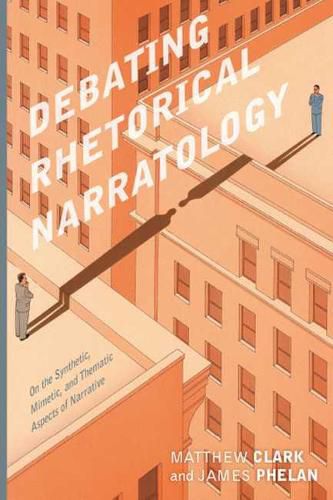Readings Newsletter
Become a Readings Member to make your shopping experience even easier.
Sign in or sign up for free!
You’re not far away from qualifying for FREE standard shipping within Australia
You’ve qualified for FREE standard shipping within Australia
The cart is loading…






This title is printed to order. This book may have been self-published. If so, we cannot guarantee the quality of the content. In the main most books will have gone through the editing process however some may not. We therefore suggest that you be aware of this before ordering this book. If in doubt check either the author or publisher’s details as we are unable to accept any returns unless they are faulty. Please contact us if you have any questions.
In Debating Rhetorical Narratology: On the Synthetic, Mimetic, and Thematic Aspects of Narrative, Matthew Clark and James Phelan provide a model of lively, sharp, and good-natured scholarly exchange. Clark proposes friendly amendments to Phelan’s theorizing of the synthetic, mimetic, and thematic aspects of narrative, and Phelan responds, often by explaining why he finds Clark’s amendments less-than-friendly. Clark rounds off the debate by offering a brief rejoinder. Clark and Phelan consistently ground their theoretical arguments in their analyses of particular narratives, drawing on a corpus that ranges from Homer’s Iliad to Tobias Wolff’s In Pharaoh’s Army and includes, among many others, Jane Austen’s Emma, George Orwell’s 1984, and Toni Morrison’s Beloved.
Clark and Phelan’s deep dive into the synthetic, mimetic, and thematic leads them to explore many other aspects of narrative and narrative theory: style, audiences, the mimetic illusion, fictionality, and more. Their investigation also leads them into questions about rhetorical narratology’s relation to other projects in narrative theory, especially unnatural narratology, and, indeed, about how to assess the explanatory power of competing theories. Ultimately, their debate is compelling testimony about the power of both narrative theory and narrative itself.
$9.00 standard shipping within Australia
FREE standard shipping within Australia for orders over $100.00
Express & International shipping calculated at checkout
This title is printed to order. This book may have been self-published. If so, we cannot guarantee the quality of the content. In the main most books will have gone through the editing process however some may not. We therefore suggest that you be aware of this before ordering this book. If in doubt check either the author or publisher’s details as we are unable to accept any returns unless they are faulty. Please contact us if you have any questions.
In Debating Rhetorical Narratology: On the Synthetic, Mimetic, and Thematic Aspects of Narrative, Matthew Clark and James Phelan provide a model of lively, sharp, and good-natured scholarly exchange. Clark proposes friendly amendments to Phelan’s theorizing of the synthetic, mimetic, and thematic aspects of narrative, and Phelan responds, often by explaining why he finds Clark’s amendments less-than-friendly. Clark rounds off the debate by offering a brief rejoinder. Clark and Phelan consistently ground their theoretical arguments in their analyses of particular narratives, drawing on a corpus that ranges from Homer’s Iliad to Tobias Wolff’s In Pharaoh’s Army and includes, among many others, Jane Austen’s Emma, George Orwell’s 1984, and Toni Morrison’s Beloved.
Clark and Phelan’s deep dive into the synthetic, mimetic, and thematic leads them to explore many other aspects of narrative and narrative theory: style, audiences, the mimetic illusion, fictionality, and more. Their investigation also leads them into questions about rhetorical narratology’s relation to other projects in narrative theory, especially unnatural narratology, and, indeed, about how to assess the explanatory power of competing theories. Ultimately, their debate is compelling testimony about the power of both narrative theory and narrative itself.